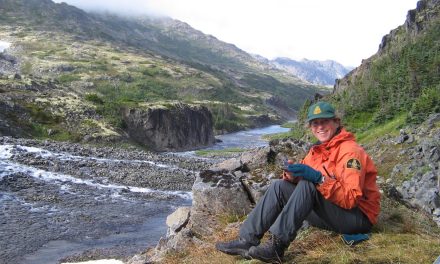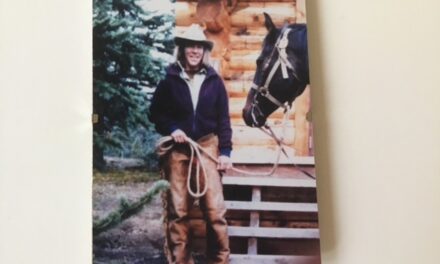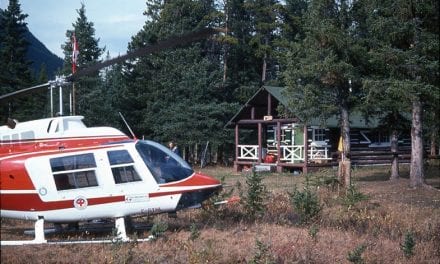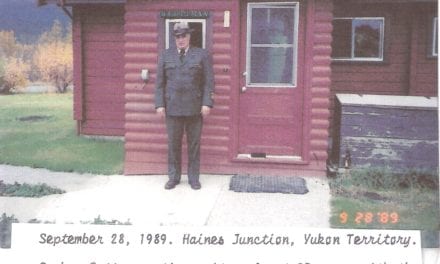MH: What were some of your main responsibilities over the years? 1050:
JT: When stationed in Lake Louise, Banff and the Saskatchewan River Crossing, work was a combination of high use area duties (which included lots of education, Law Enforcement, problem bear management, some search & rescue) and 10-day backcountry patrols (which again included education, Law Enforcement (including boundary patrols during hunting season), resource inventory, problem wildlife, trail and cabin maintenance).
One winter in Lake Louise I worked for the Calgary Regional Office colouring resource analysis maps. I found that difficult, mind numbing and tedious. In today’s world a GIS technician would just program the computer to colour the polygons…. Back then, I was the colourer.
Backcountry isn’t as extensive in Waterton, so backcountry patrols were mainly day trips. In Waterton we were the ambulance attendants as well. In Lake Louise we did some ambulance attendance stuff.
MH: What did you like / Dislike about being a warden? 1217:
JT: I really enjoyed working at something that was important and that really mattered. I was and probably still am, very idealistic and I totally bought into the mission of the National Parks. I’m a conservationist at heart. I enjoyed being challenged and learning every day; doing something different and interesting every day. I loved getting to know and understand some of the world’s most spectacular areas. It was a privilege to work in such exceptional areas.
And I really enjoyed working with extraordinary people.
Dislike:
JT: I found it really tough being a woman working as a Park Warden in the mid-1970s. Some Wardens were supportive and thought I should at least be given the chance – might work out… might not. Others were adamantly opposed. They believed there was no way I could do the job and refused to work with me. One Warden who I’d known for at least 5 years when I worked at the Post and Lake Louise Ski Area, told me if I was assigned to work with him, he would quit the Warden Service even though he had been a Warden for close to 20 years. Another Warden told me he couldn’t understand why I wanted to be a Warden. His wife would never want to do that kind of work and he just couldn’t understand why I would. Several of the Wardens’ wives were adamant that they would not allow their husbands to work with me.
One Warden was extremely vocal about how it would be impossible for me to do Law Enforcement work. (At the time the RCMP did not hire women). His Law Enforcement experiences were rampant with aggressive and sometimes violent interactions with people. Interestingly, I had several occasions to observe this Warden when he dealt with park visitors in an enforcement capacity. His entire demeanor was disrespectful, belittling and aggressive so it’s no wonder he had problems with people. I always took the time to explain why what the person was doing was a violation of the Park Act and what the consequences of their actions were to the wildlife and/or natural features of the Park. Frequently I had people thank me for getting them to move from their illegal camp or for having given them a ticket.
Over the years I was subjected to what I coined “Manhood tests”. They were a diversity of situations I would come to understand were designed or set up for me to fail. As an example – I was assigned the job of packing supplies to the fire lookout person at the Mt Eisenhower lookout which was a totally reasonable assignment. I really struggled to get the horse packed and I ended up using techniques that might have been a bit frowned on from a “humane treatment” perspective. In any case, I got the job done with no visible damage to me, the horse, the truck or the trailer. When I got back to the barn several of the guys were hanging around; I suspected they were waiting to hear about my disaster. I totally faked that it had been a great day, lovely ride, good visit with the lookout man… and I asked if I could get the same saddle and pack horses for my next backcountry trip. Later I learned that the pack horse was known to be close to impossible to pack. I realized I had survived another “manhood test”.
I understood in the Warden Service culture all new Wardens had to prove themselves and I had no problems with that at all – I absolutely didn’t want or expect to be treated differently. For me what was different was that I understood and felt the responsibility of being one of the first women in the Warden Service. I knew that my successes or failures wouldn’t just reflect on me, but would impact on the ability of women in the future who might contemplate joining the Warden Service. My failures or screw-ups would be used as reasons why women couldn’t do the job. I put a lot of pressure on myself. I tried really hard not to mess up and when I did, I tried really hard to hide my disasters or to pretend that the job or the trip went well, that everything was just fine. I recall one summer a Seasonal Warden was patrolling somewhere in the northern backcountry of the Lake Louise district. He had incorrectly tail hitched his pack horses and ended up breaking the tail / spine of his pack horse and the horse had to be shot. At the Warden Office there was a bit of talk about what a screw up that guy was but it quickly blew over. There was no question in my mind, had I done that and had a horse needed to be destroyed, it would have been blown up and would have been another brick, cemented in the argument why women couldn’t do the job.
For some unknown reason, I have a copy of my September 1977 Employee Evaluation Report, submitted by Sid Marty, my supervisor that summer. To quote: “There is some concern, that as a female, she may have limitations in one area, that of physical strength. In my opinion, she is stronger than male PRC-8s that I have previously supervised. I suggest that she needs more training and experience in mountain rescue work, in order to evaluate effectively her physical ability. She has proven herself strong enough to do all other aspects of her job.”
MH: What were some of your more memorable events as a Warden? 1915:
JT: I was working the evening / night shift by myself in the Banff high use area and decided to drive a loop from Banff, along Highway 1 A to Eisenhower Junction and return to town on the Trans Canada. My plan was to check out all day use areas and to move out illegal campers. Well, I turned into a day use picnic area and saw several 1 and 5 ton panel trucks, loads of motorcycles and a huge bonfire. Crime!!! I hopped out of my truck, stetson and all. As I walked towards the bonfire, I saw that several couches and armchairs surrounded the fire and at least 30 or more Hells Angels types – mostly men, but some women. Beer bottles and cans were everywhere. My initial plan had been to chase them out of the day use area but quickly my plan changed. I realized there was no way in hell I would get them out of there by myself, especially with no back up, and that having them camp in the day use area was the best place for them. As I approached the group it got really quiet and everyone’s eyes were on me… I’m pretty sure they were thinking “What the hell… who is this woman wearing a stetson??” I introduced myself and asked if they were enjoying the Park. We talked a bit and I cautioned them to keep the fire under control and to put it out when they went to bed. It was all very amicable and surreal!
In 1979 I was working In Waterton while my husband, Elliot Teskey, was a Seasonal Warden in Lake Louise, Cyclone backcountry. Down in Waterton we heard that a Seasonal Warden who was working in the backcountry north of Lake Louise, had died. Naturally I feared it was Elliot but tragically it was Neil Colgan. He was kicked by his horse and died on the trail of his injuries. That was a tragic and horrendous loss – Neil was a great guy! He was as idealistic and devoted to the Parks as me. His funeral was absolutely heart wrenching.
In 1979 I was offered a Seasonal Park Warden position in Waterton. My husband was a Seasonal Warden in Lake Louise. Over the summer and fall we’d travel back and forth to see each other, but as a young married couple we wanted to live together. Another couple, Tom and Diane Volkers, were in the same situation – Tom worked in Waterton and Diane in Lake Louise. The Chief Park Wardens of each Park – Max Winkler and Andy Anderson were okay with a switch, so both couples could live and work in the same area, but the Human Resources folks in the Calgary Regional Office would not allow the transfers. The policy was that a person had to work in an area for 2 years, before any transfers would be considered. Their attitude was that there were hundreds of people who would love to have our jobs, so why should they accommodate our needs. We weren’t happy with that attitude so started to look for other opportunities. In the fall a competition was held for a Fisheries Officer with the federal Fisheries Department, in Hay River Northwest Territories. Elliot applied and was offered the job. He started his job in January 1980. To us it seemed like such a bad decision on the Park’s part. We had been given extensive training in so many things; we were getting to know parts of the Parks extremely well and were developing valuable expertise and skills in a variety of areas. Leaving the Warden Service was heart wrenching for me. I loved being a Warden and had worked hard to become one. I pretty much made the decision to give up my dream job for my marriage. I find it somewhat ironic that 20 years later my marriage failed.
MH: Can you tell me about any rescue/wildlife stories that stick out in your memory? 2420:
JT: This is a wildlife story which remains indelibly etched in my memory. It was in Lake Louise and it had to do with garbage patrol. The open garbage dump below Lake Louise had been closed and a gravel pit a bit north of the village was designated as a garbage transfer area. Hotel and restaurant employees would come to the area in the late afternoon to put garbage in the big bins. Well, the grizzlies quickly learned where the new food supply was, so they hung around. Every afternoon a Warden or two would be assigned to keep the peace. Talk about a disaster! Fencing around the area was minimal and did nothing to stop the grizzlies. We tried to chase the grizzlies away from the bins so staff could dump their garbage. The entire situation was very stressful! I totally feared someone was going to die. Each of us had our own strategy when it came to loading our shotguns. I alternated SSG with slugs. I remember a grizzly bear cub got trapped inside a bin when the heavy lid fell shut. Outside the bin the sow went nuts. The only idea we had was to get all of the humans out of the area, tranquilize the sow, open the bin lid, back off and hope for the best. Every shift at the garbage transfer area stressed me to the max! I lived in fear someone was going to die on my watch, and I’m pretty sure I’m going to die a year or so earlier than I should, just because of that stress!
In Waterton one Sunday, I was the Duty Warden and was the only Warden working that day. I received a report that a woman riding on a riverside trail had been attacked by a grizzly. The report said that the woman and the horse were okay, but the grizzly remained in the area. Max Winkler and I went to check things out, we carried shotguns. The trail went along a river and had thick riparian vegetation on both sides. We walked very slowly, and were both on high alert; in front was very big Max, with much smaller me following. I thought I could hear a noise – Max heard nothing. To me it sounded like something big chewing on a bone. The hair on my neck stood out straight. Still Max heard nothing – he was somewhat deaf. Eventually we saw the grizzly. It was chewing on a cow parsnip stalk. I was overjoyed the grizzly wasn’t chewing on someone’s leg! We closed the trail and the next day Keith Brady set a snare. The grizzly was caught, tranquilized and flown to the northern part of the Park.
Also in Waterton Park, another grizzly story at Bertha Lake. A grizzly bear had been in the Bertha Lake area for a while, bothering campers, so the trail was closed. My job was to ride up to the lake to see if the bear was still in the area; when the bear didn’t move out, a snare was set. The snare cable was attached to a large chain which was looped around a big stump. The bear must have gone wild when it was snared. When we got back the next day, the area around the stump, to the reach of the chain and cable, was flattened and at least a foot deep. The soil was absolutely pummeled. Several of us went in; the bear was tranquilized and as we were taking the snare off, we realized that the bear’s movement overnight had worked the chain kind of like a saw and the stump was very, very close to being sawn through. A small chunk of the stump was all that was holding the bear. That could have been quite the disaster, had the stump broken through when we arrived that morning!
Interesting side story to the grizzly up at Bertha Lake. On my way down from one of my patrols up the trail to see if the bear was still in the area, I encountered a family near the trailhead, mom & dad and 2 blond kids – a boy and about a 10-year-old girl. I told the family the trail was closed and explained why and continued on with my day. Well, about 15 years later I re-encountered the blond girl at a dog obedience trial on Vancouver Island. Life can be so strange! Wendy and I became close friends and remain friends today. Her memories of that encounter are extremely vivid. Her first thought was “Great! We don’t have to hike that steep trail”, then being a horse crazy kid, she thought – “Hey, that woman has the best job – she gets to ride a horse”. Then she thought “Hey – that’s a woman Park Warden….maybe I could be a Park Warden”…



